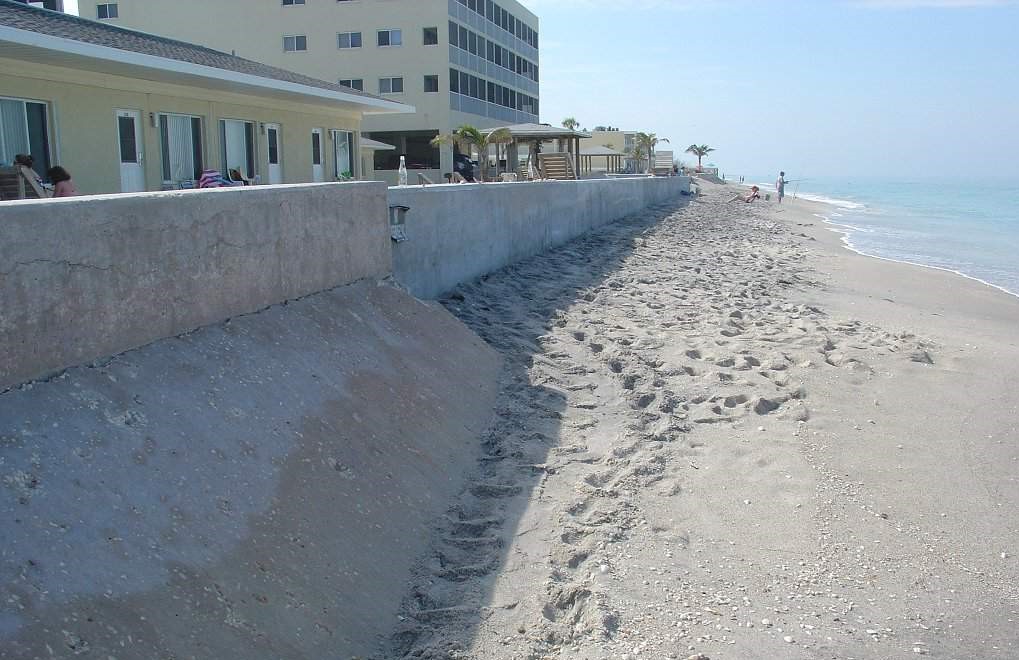Florida’s globally-important sea turtle populations face myriad anthropogenic threats, with coastal armoring and artificial lighting being among the most urgent. During the 2021 Florida Legislative Session held in March and April, Sea Turtle Conservancy (STC) advocated against two bills that would have greatly worsened both of these threats.
One of the bills (HB 1133 and SB 1504 – Coastal Construction and Preservation) sought to weaken the regulation of coastal armoring, which would have facilitated a rapid expansion of sea wall construction along important sea turtle nesting beaches in Florida. Seawalls block turtles from reaching the upper portion of the beach, causing them to nest in less-than-optimal nesting areas lower on the beach where their nests are more susceptible to waves and inundation.

In addition, studies have shown that fewer turtles emerge onto beaches with seawalls than onto adjacent, non-walled, natural beaches. Sea walls also disrupt natural beach dynamics and increase the rate of erosion down the beach. This can create a ‘domino effect’ that necessitates more and more seawalls, destroying sea turtle and shorebird nesting habitat.
Introduced by Representative Tom Leek and Senator Tom Wright, whose districts include parts of Volusia and Brevard Counties, the bill would have eliminated any consideration of whether upland structures are actually vulnerable to erosion before qualifying for a sea wall. If a beachfront property owner requested a permit to build a sea wall (or sought a permit for a wall already installed illegally), the Florida Department of Environmental Protection (FDEP) would be forced by law to grant the permit. This process would result in no consideration of impacts to the beach, neighbors, other natural alternatives or federally protected sea turtles.
After STC learned of the bill, Executive Director David Godfrey and Holly Parker-Curry with Surfrider Foundation met with the primary bill sponsor. As is often the case with short-sighted legislation like this, the bill was designed to appease a particular group of local constituents whose request for a sea wall permit was denied because their homes are not actually vulnerable or eligible for sea walls. In attempting to resolve a narrow local issue, the sponsors were willing to roll back protection for sea turtles and coastal habitat throughout Florida.
Following vocal opposition by STC and our colleagues, both the House and Senate versions of the bill died in their first committees. However, this issue is likely to come back during future legislative sessions, as beachfront property owners continue to face the impacts of sea level rise and coastal erosion in Florida. STC will continue to advocate for natural solutions to this worsening problem, including the use of living shorelines, beach nourishment, managed retreat from heavily eroding beaches and stricter policies on where people can build on the coastline.
Another bill sought to strip local governments of their ability to regulate certain building design elements on private homes. This developer-backed legislation was not intended to directly impact sea turtles, but the wording was so vague that it would have inadvertently eliminated the ability of coastal counties and municipalities to enforce sea turtle lighting regulations. Language in the bill would have prevented local governments from regulating any “exterior nonstructural architectural ornamentation” on single- and two-family homes in Florida. The bill, S.B. 284 and H.B. 55 – Building Design, was introduced by Senator Keith Perry and Representative Toby Overdorf. Since the exterior lighting used on homes would fall under definitions contained in the bill, if passed the legislation would have undermined all local sea turtle protection ordinances that prohibit unshielded white lights during sea turtle nesting season, which could result in an increase in sea turtle disorientations statewide.
After alerting the Florida Fish and Wildlife Conservation Commission’s (FWC) Legislative Affairs office about the potential impacts of the bill, STC drafted an amendment that, if added to the legislation, would ensure sea turtle protection ordinances remained intact. Despite numerous attempts to get the bill’s sponsors to acknowledge the unintended glitch and support our amendment, this approach was getting us nowhere. Eventually, STC contacted Senate Majority Leader Debbie Mayfield, whose district includes the Archie Carr National Wildlife Refuge in Brevard and Indian River Counties. Senator Mayfield took the issue very seriously, knowing how important sea turtles are to her constituents.
With her leadership, STC’s amendment was eventually added to version of the bill that eventually passed. STC is appreciative of all of our partners at FWC, the Surfrider Foundation, Florida Conservation Voters and within the Legislature who moved this amendment forward. We are particularly grateful to Sen. Mayfield for her leadership on this matter.
Although STC’s work on these two bills resulted in good outcomes for sea turtles in 2021, another round of bad bills for sea turtles is likely to arise next year. If a proposal is particularly damaging to sea turtles, STC will alert its members and followers and encourage them to contact representatives in the Legislature. We have defeated harmful proposals together in the past, and we are confident that we will have the same success in the future.
Make sure you subscribe to our e-newsletter and/or follow us on social media @conserveturtles to receive Action Alerts and other legislative updates. Email lexie@conserveturtles.org with questions or to sign up now!